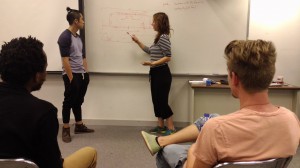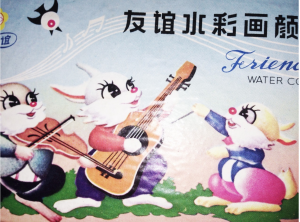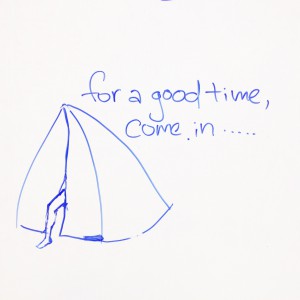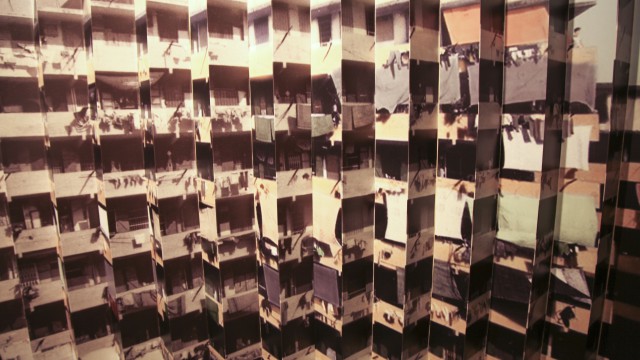
Experiencing the space in between
Two people coming from different places will always have different perspectives on their environment. It may be the personal, socialized, disciplinary, traditional, explicit or implicit culture which influences this perspective. Fact is that in a group of 6 or 7 people each one has an own room of comprehension. By connecting over mutual work a new space is formed: The space in between that origins from trans-cultural friction.
The “Common Stage” work groups now exist for 2 weeks in which they spent intense working and leisure time together. During an open discussion with all participants friction points became visible. Most groups had the problem of too much talking. “When we were developping a concept over the last week, we were sometimes going in circles. We were using the same words such as ‘story’ but found out later that we understand totally different things”, said a group member of ‘it’s kind of magic’.
Also no one wanted to step on each other’s feet. Since all participants knew each other only a few days, the respectful shyness sometimes slowed the discussions down. However, the students did not blame the obstacles of trans-culturality for that. “I think we had some trouble communicating because of our different ways of thinking. In our group we have designers who work service oriented, artist who rely on facts and theatre people who work very visually. All these disciplines generate different working processes. So I think it’s not a cultural thing, but due to people’s personality”, as a stundent of ‘black hole’ described it.
But after project leader Daniel Späti insisted that it cannot be reduced to personal behaviour, some far-reaching topics came up. A student from ‘it’s kind of magic’ said about language issues that “there’s not always time for a proper translation. So people with the same language have an advantage of understanding each other quicker.” The back and forth not only consumes time but also concentration. “On the other hand”, reversed a member of ‘liè’, “did these language difficulties made me pay more attention to my own speaking. I became more aware of the coomunication habits of my group.”
Elizabeth de Rosa who was guest lecturer of the week and does research about trans-culturality described such moments of misunderstanding as breaking moments where unforseen developments can occur. In the end, Nuria Krämer, Head of Connecting Spaces Hong Kong, found the motto for the next weeks: “Sometimes there are rewarding misunderstandings and the main goal is not to understand all disciplines completely so they don’t occur anymore. That’s an illusion anyway. All groups should find a way how they can cooperate best so it works for themselves.”
Yet, here are some insights into group experiences with trans-culturality/-personality/-disciplinarity:
black hole:
Our perception and understanding of aesthetics was different. There are some who wanted minimalism and some who wanted a little bit more and some who wanted a little bit less. This process proved the ways of looking at a reality is very different and can be at times confusing.
But this is very helpful to pushing the discussion forward because we clearly defined what we wanted and not wanted. The term “story” and “narrative” was also another issue that we faced as we had different understandings of what consisted in a story and what we would like not to have. Also where the root of the final product was coming from was essential to us as a team. We want our art to have depth but at the same time this word also proved to be very paradoxical.
So all in one we can say that there are different understanding of words. Probably also because words get lost in translation. The positive aspect of this is that this creates new points of view and new ideas occur. Another surprising aspect was that Shu ching mixed western electronic music with her traditional chinese operah dance which was fascinating for all of us.
it’s kind of magic:
On monday we celebrated Gigis Birthday. We decided to do this in the european way, buying a little cake, a present and also singing for her. All this without asking how the chinese usually do this and if they feel okay with it. Gigi did. She even took an umbrella to complete our chorus line. The Result: a complete new transcultural Birthday Ceremony.
裂 liè:
Donald
Since theatre works always need time to evolve/grow, it is quite difficult to figure out what will the final product look like in advance before rehearsals. To me it is quite rare to be asked about how will the final product look like in advance.

TT
Miriam once asked me about my shoes, and I told her that I wore them while doing exercises. She told me that she also got a pair like that. For her, they are a pair of comfortable shoes, but to me they are responsible to keep my acting standard.
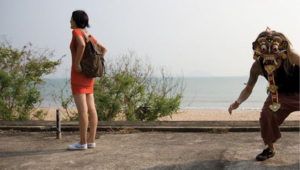
Angie Li
One of my transcultural experiences is that being a Hong Konger, we
also fear that rejecting others request is a bit impolite. However, I
realise from my group members that we should not think in this way. In
the contrary, we should express what we think so that we will be able
to work smoothly.
Miriam
People in Hong Kong walk slowly. I feel like falling asleep when I pass the streets. Now they are telling me that they think that Europeans walk slowly. They wait for us while we were waiting for them.

PeaNutButter CATs:
In general ‘Sex’ is a sensitive topic in society. And every society has their conservative and open counterparts. When we were discussing whether we could apply sex’s element into our performance, especially people in our group from Hong Kong and Macao, felt shy and never thought about incorporating sex the way that the other participants in our group did. However, people
from Zurich and Singapore would think sex is a kind of open subject and not a taboo. For us, it is very interesting that sex discussion has provided us with an opportunity for intellectual and conceptual exchange between Asian and European. At the end
of the day we were all able to distill sex from its taboo and just focus on the art itself. That drives us to reach a common understanding. Also it would be great to have an open‐minded platform for sharing and further discussion which each of the group-mate have never tried before.
In this particular instance we see that a difference in the diverse cultures affects thought patterns. As a result there is a censorship in the creation because different culture has a different understanding in an idea. Identifying and recognizing the self-censorship in
an exchange was very useful to us. Horizons can be broaden in this aspect. One party might not suggest particular development due
to this unconscious self‐censorship or even if particular development was suggested it was hard to consider by another part from a different censored attitude. But expressing it allows for these blocks to be solved. This proved to be very useful to our group.
touch?:
Don’t do that, it’s embarrassing!
One of the key experiences was made by a member of the Swiss delegation who went for dinner with a local friend in a restaurant in Causeway Bay. Due to space limitations, small dinner tables are often shared between strangers here. Thus it feels very natural or polite for a European person from a rather spacey area to greet the unknown table-mate with a friendly “hello”, to break the ice and introduce themselves to the people the evening will be shared with. But it didn’t quite work out how the westerner expected it to. Visibly shocked at the sudden greeting, the locals just sat there and stared back with a cold, baffled gaze that pierced the awkward silence. The local companion then pinched the Swiss in their side and whispered “What the hell are you doing?”.
It is common in Hong Kong to maintain a thick invisible wall of privacy for discreetness and as a protection against the inevitable physical proximity in a crowded metropole like Hong Kong. Unwanted contact is avoided to respect each others privacy and comfort.
Goal vs Compromise
Another experience is about finding a good compromise during the working progress, which are defined in two different directions within the group. The Swiss student feels a intercultural difference in the discussion style described as oppositional argumentation of the European students and the diplomatic way of the Chinese students that tries to combine and include many different ideas to develop a combination. Whereas in the discussion about this theory there were many different opinions such as the influence of the personality which is seen as bigger reason for discussion habits.
